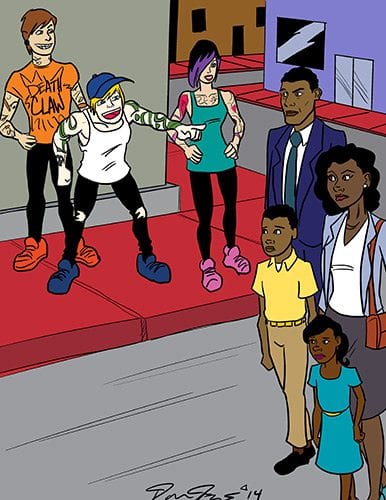
A cultural cancer afflicts the country. Racism is far more prevalent than people perceive. Irrelevant rants about “negroes” by Cliven Bundy, the deadbeat Arizona rancher, can be dismissed as the ravings of an unfortunate eccentric. After all, he apparently also believes that the United States of America does not legally exist. Therefore, he believes he does not owe the federal government the fees for grazing his cattle on U.S. land. Bundy also believes that slavery is preferable to poverty with its inadequate government subsidies. While Bundy may be viewed as an outlier, that cannot be said of Donald Sterling, the owner of the Los Angeles Clippers basketball team.
Sterling has attained the American Dream of acquiring great wealth. Nonetheless, he has expressed racial attitudes as bizarre as those of Bundy. Sterling complained to his female companion, V. Stiviano, that he did not want her to associate with black people. He objected to her including in her Instagram collection a photo of her with the former Los Angeles Laker basketball star Earvin “Magic” Johnson. Sterling also scolded her in a recorded discussion, “don’t bring black people to my games.”
Strangely enough, V. Stiviano, who frequently accompanies Sterling to games is not white, she is black and Mexican. And strangest of all, Sterling’s ownership of the Clippers represents a substantial portion of his net worth and about 78 percent of the athletes in the National Basketball Association are black. Despite the risk of offending his players, Sterling seems to be unable to control his racism enough to protect his assets.
Another aspect of this encounter to be noted is that Sterling’s conflict with V. Stiviano developed over a photo with Magic Johnson. Since retiring from basketball, Johnson has distinguished himself as a very successful businessman. His business achievements have made Johnson welcome in the executive suites of major corporations. However, Sterling would not welcome Johnson courtside at a Clippers game if he is brought by V. Stiviano.
From Sterling’s perspective, success and achievement do not enhance the status of blacks. This attitude is commonly demonstrated in bigots who refuse even to respect Barack Obama in his status as president of the United States. Some of them oppose Obamacare even though they need medical attention. As a result, 23 states have refused to expand Medicaid coverage.
Conflicts between groups are common in history, but there is usually a reason. The groups have opposing religions, ancient battles that are long remembered, or disputes over boundaries establishing territorial rights. Whites have no such differences with African Americans. So what could be the basis for the racism?
Undoubtedly, every individual has his or her own reason for bigoted attitudes. However, it is clear that society imposes and tolerates an inferior status on those not of Caucasian descent. Frequently, whites who feel insecure about their standing in society will be the most aggressively racists. There is indeed something of value for them to protect because whites, especially affluent whites, enjoy a privileged social position.
The Bundy and Sterling incidents reveal a serious American problem that needs remedial attention. Americans still have much to learn about the real meaning of equality.






